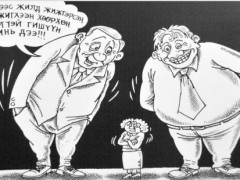Mongolian Women’s Participation in Politics

With the parliamentary elections in Mongolia approaching next month, there will be more women’s nominations as woman’s quotas for political participation have now been approved by the parliament. Eleven parties are registered to run in the June 2012 elections, and each party will have to try and reach a target of 20% women in this election as this is the new quota that replaced the previous quota of 15% of women candidates when the new election law got passed by parliament last year on 15 December.
Even so, in the last two decades Mongolian politics has been increasingly male dominated. According to an analysis by the Mongolian fem.network, women’s representation in parliament has dropped sharply from 24.9 % in 1990 to a low of 3.9% in 1992, 12% in 2000, 6.6% in 2004 and finally 3.9% again in the last election in 2008.What this means is that the rate of Mongolian women’s participation in politics is four times lower than the world average and twice as low as that of Arab countries.The survey shows that
Mongolia ranks 121th out of 134 countries when it comes to women’s participation at the decision-making level.
Participation of woman in social and economic sectors is stronger as women make up 51.7% of the total population. More than 70% of workers in the education, health and social sectors are women and they have shouldered responsibility in these sectors very well indeed. However, it still remains a paradox that more than 90% of the people in positions of power in Mongolia are males.
Women’s quotas for a share of seats in parliament were discussed four years ago, but the amendment was not approved by the male dominated parliament at that time. However, after four years and with much difficulty, it has finally come through. The credit for this actually goes to the inspiring examples set by other countries as well as to the force of the opinions voiced by the world’s most influential organizations which have highlighted the inappropriateness of having very few women at decision-making level in Mongolia.
“But quotas alone will not get women elected nor ensure them a seat in parliament. Political parties need to embrace women candidates and actively promote them,” said Rebeca Grynspan, UNDP Associate Administrator, in a video address at a two-day regional conference Charting a Path for Political Equality in Asia organized by UNDP and the National Committee on Gender Equality of the Government of Mongolia, and held at Ulaanbataar in early April.
In February 2011, the Mongolian parliament passed a law on gender equality, which was the fruit of 16 years work and effort by female members of parliament and NGOs. Nevertheless, some empowering provisions were left out, such as a nomination quota for women and a provision dictating that if the head of a government organization is a man, the deputy should be a woman. Even so, this is still a major advancement in both civil rights and women’s rights.
Decision-makers recently discovered that Mongolian politics is distorted at the decision-making level, and discussions have started to change this. The Government has initiated workshops and international conferences, and women’s groups have also been active.
Recently several women leaders initiated a women’s club to support women in the next election. They discussed “other windows of opportunity” such as ways for funding during elections and ways to change party rules for paying large amounts of money. However, initiating and acting on something new is not easy because influencing the deep rooted political establishment is indeed a very tough call.
One of the reasons for this is that election campaigns are too expensive. If someone wants to nominate a candidate for election he/she has to pay a large amount of money to the party by which they want to be nominated. This deters women from approaching these parties as a large part of finances are only accessible to men and usually controlled by them. Civil society always viewed the elections as unfair and the actions of political parties as dirty. Some women leaders also showed that the Constitutional Law is not enforced equally, and that discrimination against women by age and economic standing has worsened since 1990.
While there is no simple formula that works for every country, all political parties in Mongolia have included many women members since 1990 and women have always been in the forefront of social, economic and political reforms. However, when it came to choosing political leadership, women always lagged behind. The passing of the new election law has been clearly commendable. Let’s hope it helps in getting more women elected this time as there are currently only three female member of parliament. Some major parties will have to do some pretty desperate candidate-identification before they can field 20% female candidates!
Tags: decision making, elections, leadership, politics, women's participation

